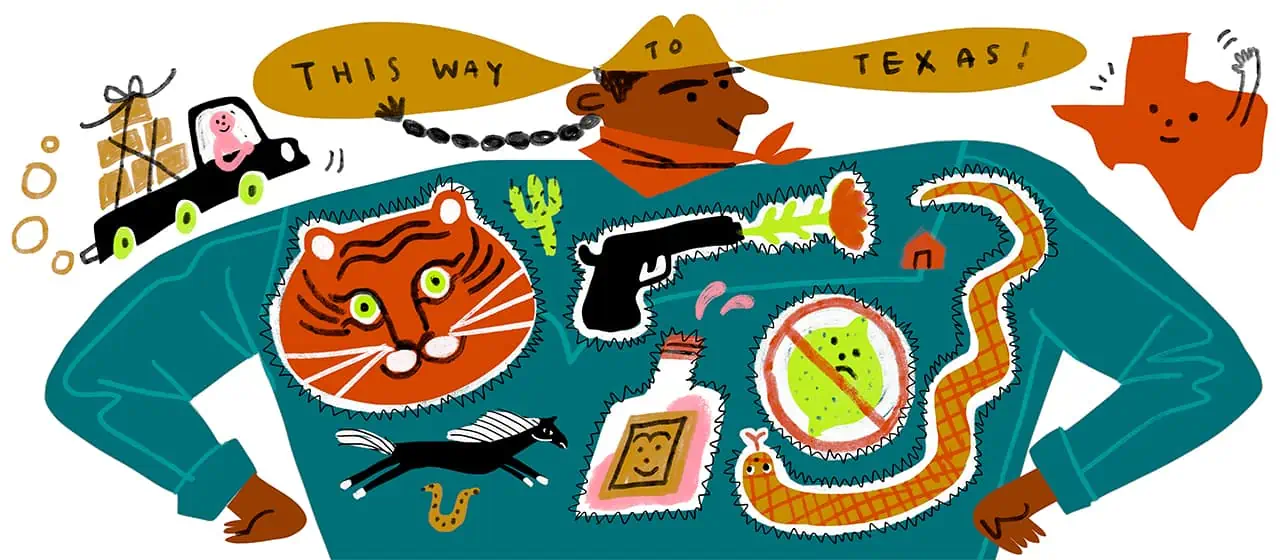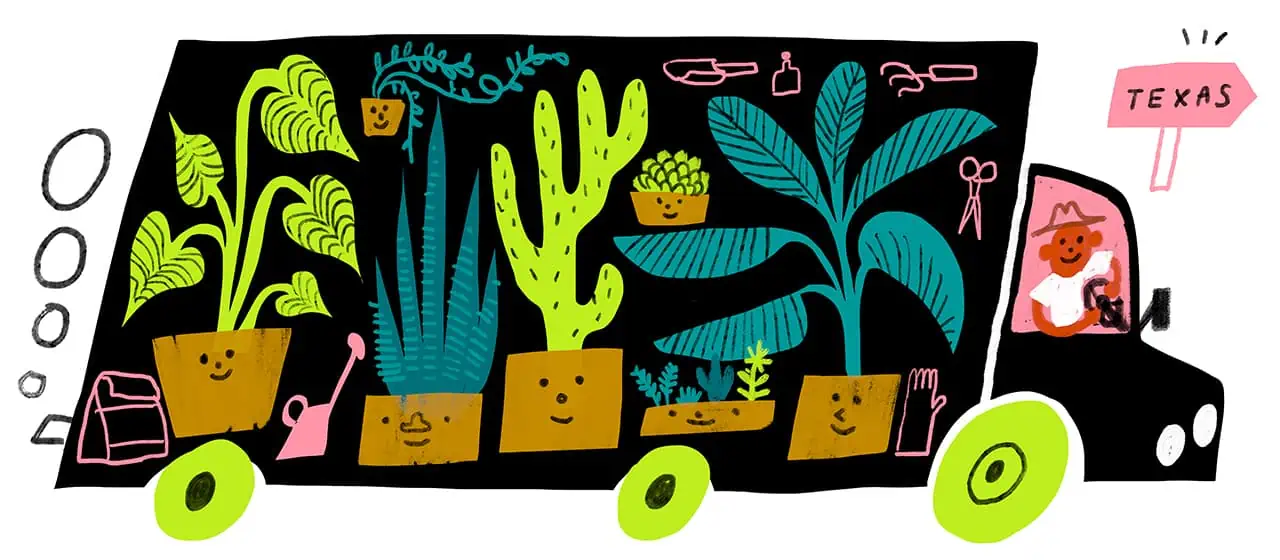The Stuff That’s Illegal to Bring Into Texas
Posted in: Moving Checklists & Planning, RegulationsRegardless of whether you’re moving from out of state to San Antonio, Dallas, or somewhere else in Texas, like relocating anywhere using long distance moving services, you’ll hold the responsibility of needing to know the laws of the land. Every state differs, and some states are stricter than others. But when it comes to what you can and cannot transport across state lines – and what you can or can’t possess once you’re there – we are sure there is no state quite like Texas.
Here are all the things that are illegal to bring into Texas, broken down by type. Welcome to the wild, mild west.
Fruits and Vegetables
While Texas may have a reputation for oil wells and football teams, the state also boasts a humongous $100 billion agriculture industry. It is no surprise then that they have more than a few rules regarding what fruits and vegetables can’t be brought over state lines.
The good news is the Texas Department of Agriculture spells out all the rules right here in this document. The bad news is this document is 21 pages long and uses a lot of big words. If you’re the type to snack on exotic fruit with hard-to-pronounce names, you may want to read carefully over the TDA’s rules. For the rest of us, here are the basics:
Of particular interest is the citrus fruit family. As the Southwest Farm Press states, “With very few exceptions, no citrus plants, or even pieces of citrus plants are allowed into the state from anywhere.” The National Plant Board gets a bit more technical, explaining (on page seven) that, “any living or non-living rootstock, leaf, root, stem, limb, twig, fruit, seed, seedling or other part of any plant in the botanical family Rutaceae, subfamily Aurantioideae.” As citrus is a huge part of the Texas economy, even one bad plant could potentially ruin entire crops.
Here’s $25 Off Movers

In addition to citrus fruits, Texas has plenty of prohibitions in place. If you’re coming from Florida or Puerto Rico, these things are some of the major items prohibited:
- Apples
- Avocados
- Bell peppers
- Blackberries
There are more than 50 kinds of fruits, vegetables, berries and spices that Texas prohibits coming from down south, due to Caribbean Fruit Fly infestation.
If you’re coming from anywhere in the US (except California, Arizona and parts of New Mexico), Texas also prohibits:
- Hickory trees
- Pecan trees
- Walnut trees
As well as “…(any) parts thereof, except extracted nut meats”, thanks to the never-popular pecan weevil.
Finally, these vegetable plants are not restricted but heavily regulated coming from anywhere, due to a whole host of diseases and pests:
- Tomatoes
- Cabbage
- Cauliflower
- Broccoli
- Collards
- Peppers
- Onions
- Eggplants
It’s all right here in this exhaustive “Summary of Plant Protection Regulations“ from the Texas Department of Agriculture. Give it a read if you have the time and the will. Or just play it simple and leave every last lemon, walnut and berry behind.
Pets
We have some good news for all you Texas-bound pet owners. The Lone Star State merely requires that all dogs and cats be certified as rabies-vaccinated.
The bad news is that something as simple (and responsible) as keeping Rover on a legal leash requires a watch, a map, a thermometer, a tape measure and a weather forecast. According to Texas statute “§ 821.077. Unlawful Restraint of Dog” :
(a) An owner may not leave a dog outside and unattended by use of a restraint that unreasonably limits the dog’s movement:
(1) between the hours of 10 p.m. and 6 a.m.;
(2) within 500 feet of the premises of a school; or
(3) in the case of extreme weather conditions, including conditions in which:
(A) the actual or effective outdoor temperature is below 32 degrees Fahrenheit;
(B) a heat advisory has been issued by a local or state authority or jurisdiction; or
(C) a hurricane, tropical storm, or tornado warning has been issued for the jurisdiction by the National Weather Service.
(b) In this section, a restraint unreasonably limits a dog’s movement if the restraint:
(1) uses a collar that is pinch-type, prong-type, or choke-type or that is not properly fitted to the dog;
(2) is a length shorter than the greater of:
(A) five times the length of the dog, as measured from the tip of the dog’s nose to the base of the dog’s tail; or
(B) 10 feet;
(3) is in an unsafe condition; or
(4) causes injury to the dog.
Considering all this, it might just be easier to get a tiger.
We’re not kidding. Reading the Texas laws regarding owning exotic animals – including lions, tigers, bears and gorillas (seriously) – it seems only as difficult to register a “dangerous wild animal” as it does a pickup truck.
(While we’re at it, we’ll mention that it is legal in Texas to own flamethrowers, venomous snakes and, for the truly under-stimulated, military-grade tanks.)
But back to the world most of us inhabit. If you are relocating to Texas, you should know that certain species of fish and other aquatic life are prohibited. Despite their lengthy explanation on the environmental and economical destruction wreaked by the lionfish, the Texas Parks & Wildlife Department doesn’t list this non-native critter among their outlawed types of marine life. Here are just a few of the fish that are prohibited:
- Tilapia
- Piranhas
- Freshwater Stingrays
- Freshwater Eels
- Temperate Basses
- Oysters
All resources and information considered, it seems reasonable to believe you’re okay bringing your parakeet with you to your new home in Texas. But we strongly recommend checking with your local authorities as to what laws apply to your pets. As an example, in Waco, all dogs, cats and ferrets must be vaccinated against rabies; all pets must be spayed/neutered and microchipped; dog houses must have at least three walls in addition to a roof and a floor that is not the ground; and no, you cannot give your pet its rabies shot yourself.
Alcohol
The good news here is that Texas puts no limits or taxes on any alcoholic beverages you are transporting into the state, as long as you are in the process of relocating to Texas and the alcohol in your possession is intended for personal consumption only.
The bad news is that the Texas heat will skunk your swill faster than you can say “Lone Star Lager”. So you better hope that your’s isn’t a long distance move in the heat.
Keep in mind, however, that once you are actually settled in the Lone Star State, you’ll be subjected to fines and/or jail time if you fail to declare that case of tequila on your way home from Mexico, or any other alcohol you bought out of state and are transporting back into Texas.
As for figuring out the laws in your particular municipality for purchasing beer, wine or liquor, good luck.
Plants
Texas has no apparent problems with houseplants that are grown indoors in a commercially-prepared potting mix (rather than in soil) and are free of pests and diseases. These may enter Texas without certification.
However, according to the same “Texas Dept. of Agriculture Summary of Plant Protection Regulations” we saw earlier, “houseplants grown or kept outdoors require a phytosanitary certificate from the department of agriculture of the origin state indicating freedom from pests and diseases.”
We’ll be blatantly honest here. There seems no guarantee that your word will be good enough if someone wearing a TDA uniform asks if you’ve ever put your rubber tree plant out on the patio or the front porch, and you say no.
And just in case you were wondering, you can’t bring all that firewood for your backyard chiminea. Texas doesn’t even like Texans moving firewood from one part of the state to another, for fear of spreading potential or active infestations. Check out the Texas info on DontMoveFirewood.org – and consider giving that chiminea a good washing too before trying to carry that across the border into Texas.
Firearms
And what would Texas be without guns? In keeping with their wild, wild west reputation, the state makes it easy for lawful firearms carriers from other states to legally carry in Texas, either through reciprocal or unilateral agreements with those other states. In other words, just like having a driver’s license from another state allows you to legally drive in Texas, having a permit to carry a firearm in another state allows you to legally carry your firearm in Texas.
The analogy is not perfect, of course. Texas has no firearm-carry agreements with Oregon, Wisconsin, Minnesota, Maine, Vermont or New Hampshire. And while you have 90 days upon relocating to Texas to switch your driver’s license over, there is no requirement whatsoever to register your firearm in the State of Texas.
None.
How’s that for wild?
It’s not complete anarchy, of course. “Texas requires any individual in possession of a handgun to inform a law enforcement officer of their permit or license to carry if an officer asks them for identification.” Texas also spells out restrictions and requirements regarding carrying in vehicles, open carry and places where carrying is illegal.
As far as transporting your firearm from your old state to your new home in Texas, your most pressing concern might be following the laws of the various states you may be passing through along your way.
In some ways, Texas seems like an almost lawless land. In others, the laws can seem unduly convoluted. You can have a gun. You can get a tiger. Just be sure to leave the tangerines behind!







